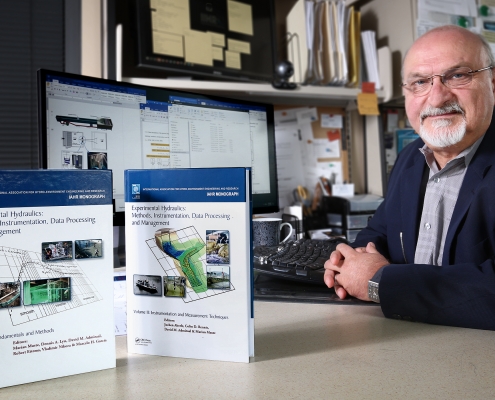Muste’s Fourth Fulbright to Take Him to Hungary
IIHR Research Engineer Marian Muste will travel to Hungary on his fourth Fulbright Fellowship for the spring semester of 2022.
Muste will be teaching and conducting research at the Budapest University of Technology and Economics. In the classroom, he will be teaching from Experimental Hydraulics: Methods, Instrumentation, Data Processing and Management, a two-volume comprehensive textbook on experimental hydraulics published in 2017 that Muste designed, edited, and led to completion (pictured here).
Receiving a Fulbright Fellowship is one of the most prestigious honors in the academic world. Earning a second is impressive, and to get a third is rare indeed. But IIHR Research Engineer Marian Muste will travel to Hungary on his fourth Fulbright Fellowship for the spring semester of 2022. Muste, who is also an adjunct professor in the University of Iowa Department of Civil and Environmental Engineering, says his previous Fulbrights took him to Germany, Thailand, and Romania (his country of birth).
Muste will be teaching and conducting research at the Budapest University of Technology and Economics. He will be teaching from the textbook, Experimental Hydraulics: Methods, Instrumentation, Data Processing and Management, a two-volume comprehensive textbook on experimental hydraulics published in 2017 that Muste designed, edited, and led to completion.
In addition, Muste will be deploying new instrumentation for the measurement of bed load in streams, in collaboration with his longtime colleagues, Sandor Baranya, Tamás Krámer, and János Józsa. Muste previously hosted Baranya and interacted with all three researchers at IIHR at the University of Iowa. Part of the appeal of this trip is the opportunity to reconnect professionally with these colleagues and friends, Muste says.
His research will expand our understanding of bedload (sediment that is carried along the bottom of a river or stream, rather than in the current) dynamics in rivers by taking a new acoustic mapping velocimetry technology from the lab to the field. Muste says he’s excited to further develop this innovative combination of measurement techniques and analysis protocols to better understand the progression of bed form movement and the bedload contribution to the overall sediment transport.
Muste, a native of Romania, says visiting neighboring Hungary is also a “sentimental journey,” almost like going home. He speaks Hungarian and is looking forward to enjoying the cuisine there. “Mostly dry-cured ham and spicy smoked sausages,” Muste says.
But Muste says he is primarily looking forward to this opportunity to teach and to explore exciting new technologies, and then publishing the results in an academic journal


